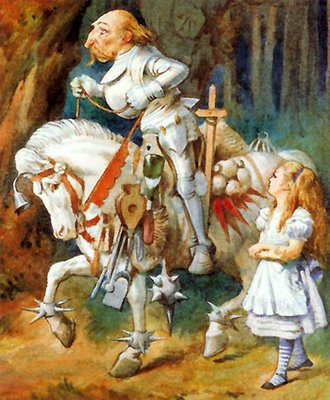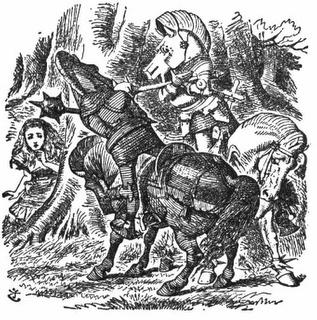
One of our textbooks for children’s literature was Alice’s Adventures in Wonderland & Through the Looking-Glass by none other than Lewis Carroll. Imagine what my friends from other departments thought when they asked, “What do you do in children’s literature?”
And I answered, “Read Alice in Wonderland.”
Every one was so surprised they would shout thoughts at random, “Oh I remember that book! Didn’t the author write that while he was on acid?” One of my good friends even surprised, and impressed, me by reciting the beginning of You are old, Father William! He admitted he was shy about knowing the poem because it was from a children’s book. I told him children’s book or not it’s one of the best books of all time, and no one should be ashamed of referencing such a classic and iconic figure in literature.
A quick history of my reencounter with Alice goes like this. Unfortunately, before this class, I hadn’t been exposed to this book in years and that annoys me. When Dr. Sexson fist mentioned that Alice would be another text for the course I grew ‘curious.’ What I remember about Alice from my childhood is watching the Disney version and distant snapshots of my mother reading certain chapters to my siblings and I before bed. One chapter she must have left out was the hookah-smoking caterpillar. When I read that this semester I was practically rolling on the floor laughing! ““Who are you?” Said the Caterpillar. … Alice replied, rather shyly, “I – I hardly know, Sir, [caterpillars prefer to be addressed as sir, Alice knows this] just at present – at least I know who I was when I got up this morning, but I think I must have changed several times since then.”” If Charles Dickens could have know perfect bliss by marrying Little Red, I could known perfect bliss by marrying Alice. Is that weird since my grandma’s name is Alice?
So from my childhood, before this class, I didn’t know Alice very well. Now, after a journey down the rabbit hole, through the looking-glass, and all around Sunderland I can’t help but find Alice references everywhere. One morning this semester I was having breakfast with my mother – yeah, you could call me a mama’s boys but she’s the strongest person in my family – at Main Street Over Easy. Hanging on the wall directly beside our table and over our heads was a series of pictures depicting eggs. But these weren’t ordinary eggs, they were seated in cup that resembled candlestick holders, and some had two legs. I believe there are garments painted on the eggs too; it felt as if Humpty Dumpty, Tweedledum, and Tweedledee were all sitting around my mother and I laughing and socializing and teasing the server – almost like a dream.
If I had to choose one chapter that’s my favorite I don’t think I could. The whole book is incredible. Reading it again in college with a better understanding of archetypes, patterns, connections, levels, and modes, and phases in literature not only presents the text from different perspectives but makes it easier to enjoy it for what it is, an amazing story, and appreciate it with both a conscious passion for literature and a child’s innocence.
The Mad Tea-Party is hilarious. The hatter, hare, and dormouse banter in a way that stumps, teases, and astounds you at the same time. In Through the Looking-Glass I thought the way Carroll used nature in The Garden of Flowers to manipulate and confuse is fascinating. And the way the Queen and Alice somehow or other began to run reminds me of Mary Malone’s experiences with the mulefah’s way of traveling.
In the Chapter titled “It’s my own invention” Sir Don Quixote and his impersonator arrive, tumbling and battling over their fair dulcinea, Alice of Tobosa de Wonderland. “Another Rule of Battle, for knights errants, that Alice noticed, seemed to be that they always fell on their heads; and the battle ended with their both falling off in this way, side by side. When they got up again, they shook hands, and then the Red Knight mounted and galloped off.
Sir Don Quixote said, “It was a glorious victory, wasn’t it?””
I am also curious as to how Frye might analyze Lewis Carroll’s masterpiece. I’ll will ponder this throughout the day and try to posy something before the deadline, though I may not quit blogging till Saturday, up until I go to work.

